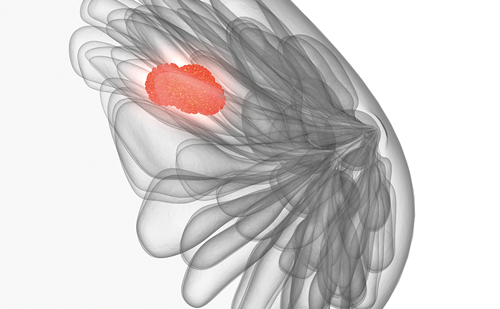Endocrine treatment constitutes the therapeutic backbone for hormone receptor-positive breast cancer,1 the most common breast cancer subtype.2 Despite its efficacy, endocrine resistance can arise3 and alternative treatments options are a pressing requirement. Recently, in the double-blind, multicentre, phase III trial, Fulvestrant and AnastrozoLe COmpared in hormonal therapy Naïve advanced breast cancer (FALCON), the selective oestrogen receptor degrader, fulvestrant, was shown to significantly increase progression-free survival (PFS) in women with hormone receptorpositive advanced breast cancer when compared with anastrozole treatment.4 Median PFS was 16.6 months in the fulvestrant-treated group (n=230) versus 13.8 months for the anastrozole group (n=232) (p=0.048). Subgroup analysis showed an even greater impact on PFS among fulvestrant-treated patients whose disease had not spread to the liver or lungs at baseline, indicating that fulvestrant would be a particularly good advantageous option for patients with non-visceral disease. For patients with visceral disease, the data would suggest that outcomes were comparable for patients treated with fulvestrant versus patients who received anastrozole. In the FALCON study, women who were hormone therapy naïve were randomised to receive either two 250 mg intramuscular injections of fulvestrant (Days 0, 14, 28, then every 28 days) or 1 mg of anastrozole, and were also allowed one line of chemotherapy. The clinical implications of the findings from FALCON are discussed by Dr Karen Gelmon from the BC Cancer Agency in British Columbia, Canada, along with other broader issues in breast cancer care.
Q: How do the FALCON data help in terms of patient selection to inform treatment decisions in clinical practice?
Like all data, the FALCON results are difficult to interpret without an in-depth assessment of the full published paper. The FALCON data are however promising, particularly given the tolerability of the drug. As well, in patients with non-visceral disease who have not been previously treated, fulvestrant looks like a good therapeutic option. A more detailed breakdown of the outcomes in visceral disease is needed; however, for example sub-analysis by lung or liver as both are included in the visceral category.
Q: What are the implications of the FALCON data in daily clinical practice given that the study included only endocrine-naïve patients?
The FALCON study involved a group of patients not usually seen in daily clinical practice that is those who had not been previously treated. The implications are that the drug will be used in patients who have had prior therapy as these patients are more common and the outcomes for this group are not yet known. As well, the availability of the new data hasn’t yet led to access to fulvestrant treatment for many patients. In addition, for maximum benefit in daily clinical practice, it would be preferable if fulvestrant were available in a more patient-friendly formulation. Fulvestrant should be administered as two consecutive 5 ml injections by slow intramuscular injection (1–2 minutes per injection), one in each buttock. Certain patients will find this process difficult and painful and this may impact on its use.
Q: How may the optimal first-line therapy for women with advanced breast cancer be defined in view of this development?
Single-agent aromatase inhibitors as first-line therapy no longer seem appropriate for many patients although we need further information on the optimal sequence of treatments. We also need data on the outcomes for single agent fulvestrant in the second- and third-line setting particularly after treatment with CDK4/6 inhibitors as well as data on the use of CDK4/6 inhibitors after fulvestrant. It is also crucial to know if any of the new trials will lead to an improvement in overall survival; survival data will be available in the future for FALCON, the PALOMA-2 (A Study of Palbociclib (PD-0332991) + Letrozole vs. Letrozole For 1st Line Treatment Of Postmenopausal Women With ER+/HER2- Advanced Breast Cancer) trials and MONALLESA-2 (Study of Efficacy and Safety of LEE011 in Postmenopausal Women With Advanced Breast Cancer) trials. When we have those data, the best sequencing of treatments may become clearer, as if there is a major survival advantage with one of the treatments, it will become the preferred standard.
Q: How may evidence be obtained that throw light on whether adherence to guidelines affects treatment outcomes in patients with advanced breast cancer?
Real world data can be obtained by looking at geographic regions where guidelines have been implemented. It is vital that the guidelines should be up-to-date and should reflect best practice. Even so, it is not straightforward to demonstrate improved patient outcomes with guideline adherence. First, there is a lag between when the guidelines are introduced and the treatment practices are taken up and, second, there is further delay before improvement on patient outcomes can be detected. While guidelines and guideline adherence are important, the processes allowing access to treatment also need to be conducted within a timely manner. Funding mechanisms also need to be tackled proactively to provide access to treatments.
Q: What advances with regards to predictive biomarkers can we expect to see in the foreseeable future?
The major predictive biomarker in the short term will be the use of circulating tumour DNA detected in plasma in breast cancer which will be used to identify actionable genomic alterations and treatment responses. In the future, predictive markers should be available to identify treatment resistance early in the course of a treatment.
Q: How can physician education enhance how sensitive and responsive clinicians are to the individual needs and expectations of each patient?
Many oncologists are sensitive to patient individuality though this can be advanced through ongoing physician education, for example, via webinars, journals and lectures. It depends on what mandatory Continuing Medical Education requirements are in place whether you would reach all relevant audiences. Emphasis on patient-centred care and the individual tolerance and response to treatments is important.











